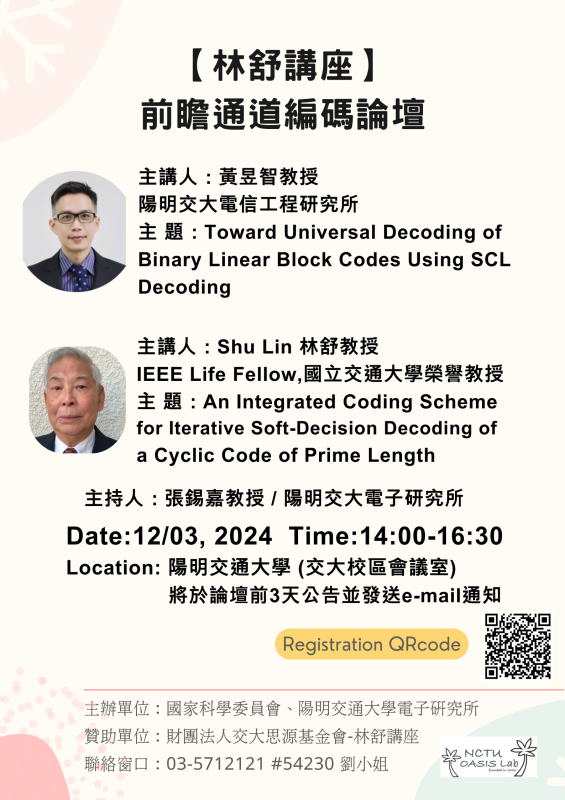演講/活動
2024-11-22 16:23:17陳秋雲【林舒講座】前瞻通道編碼技術論壇
時間:2024.12.03(二) 14:00-16:30
地點:陽明交通大學 (交大校區會議室),將於論壇前3天公告並發送 e-mail 通知
主持人:張錫嘉教授 / 陽明交大電子研究所
報名連結:
https://docs.google.com/forms/d/e/1FAIpQLSf9Z8bIELEEtttMsZ0RmWML1XhmcHP4nbjtqYRGmWNyCl_Abw/viewform
聯絡窗口:03-5712121 #54230 劉小姐主講人:黃昱智教授 / 陽明交大電信工程研究所
主 題: Toward Universal Decoding of Binary Linear Block Codes Using SCL Decoding
Abstract:
Error correction coding is a cornerstone of modern communication systems, ensuring reliable data transmission. In practice, multiple types of codes are often employed within the same system. For instance, 5G cellular networks utilize both polar codes and LDPC codes. This motivates the pursuit of universal decoding algorithms that can decode all (or many) different types of codes.
Through exploring polar codes with dynamic frozen bits, we became aware that certain classical codes can be represented as polar codes. This led us to pose a fundamental question: Can every binary linear block code (BLBC) be transformed into a polar code? We provide an affirmative answer, introducing a novel transformation that converts any binary linear block code into a polar code with dynamic frozen bits. Such a transformation can be realized by a simple permutation operation and after which, soft decoding algorithms developed for polar codes, such as the powerful successive cancellation list (SCL) decoding, can be employed to decode the original code. Simulations show that the soft SCL polar decoding of BLBCs can achieve a comparative performance to the order statistic decoding (OSD), as well as the maximum-likelihood decoding (MLD) in certain cases, with a much lower computational complexity. This result opens up vast new opportunities for future research in efficient soft decoding of linear block codes (algebraic codes in particular). This work represents a step forward in the quest for universal decoding solutions.
This talk is based on joint work with Chien-Ying Lin, Shin-Lin Shieh, and Po-Ning Chen.
主講人:Shu Lin 林舒教授 / IEEE Life Fellow, 國立交通大學榮譽教授
主 題:An Integrated Coding Scheme for Iterative Soft-Decision Decoding of a Cyclic Code of Prime Length
Abstract:
Cyclic codes form an important class of linear block codes. These codes have considerable inherent algebraic and geometric structures. Based on their structures, various algorithms for decoding these codes have been developed over the years. Cyclic codes have been widely used in communications and storage systems for reliable information transmission and storage. Well-known categories of cyclic codes are BCH codes, Reed Solomon (RS) codes, Reed-Muller (RM) codes, generalized RM codes, finite geometry codes, polynomial codes, and quadratic residue codes. Most of the algorithms for decoding cyclic codes developed so far are hard-decision decoding algorithms. Soft-decision decoding of a cyclic code is in general very complex and practically not implementable, except for a relatively short length. Developing an effective and practically implementable soft-decision decoding algorithm for cyclic codes has been a challenge problem over the years.
This talk gives a coding scheme is an integration of classic cyclic codes, classic coding techniques, modern LDPC codes, modern coding techniques, and partial geometries. With this integrated coding scheme, a cyclic code of prime length can be decoded with an iterative soft decoding algorithm based on the principle of belief-propagation to achieve outstanding error performance. In block coding, typically each message is encoded independently and each codeword for a message is transmitted independently. At the receiving end, each received word is decoded independently and no decoding information is reserved for decoding the next received word. However, in each encoding of the integrated coding scheme, a collection of messages is encoded into a collection of codewords, collectively. The collection of codewords are divided
into groups. Each group of codewords are combined into a composite codeword. The composite codewords are then permuted using Hadamard permutations. The permuted composite codewords are combined into a single global codeword through cascading, interleaving, and Galois Fourier transform. Then, the global codeword is transmitted.
At the receiving end, a received global codeword is decoded iteratively based on a low-density parity-check matrix. The received codewords contained in the received global codeword are decoded jointly. The joint decoding of the received codewords contained in the received global codeword allows information sharing among the received codewords in each decoding iteration. Information sharing enhances the reliability of each received code symbol in each decoding iteration and results in an outstanding error performance which is much better than decoding each received codeword contained in the received global codeword independently, even with maximum likelihood decoding. Furthermore, decoding converges quickly with only a small number of decoding iterations. The low-density parity-check matrix for the joint decoding a global codeword is the line-point incidence matrix of a subgeometry of a partial geometry which is the circulant permutation matrix dispersion of the parity-check matrix of the cyclic code formed by the roots of its generator polynomial.
Besides applications to typical communication and storage systems. The integrated coding scheme for cyclic codes of prime lengths may find applications in multi-users communications systems, locally error control systems, multi-locations storage systems, and adaptive hybrid ARQ systems for vehicle cellular communications for smart vehicles and smart highway communications.




